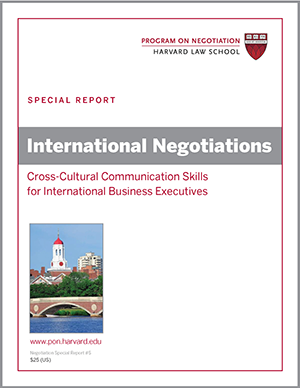
In discussing international negotiations and cognitive biases in negotiation, professor Cheryl Rivers of Queensland University of Technology in Brisbane, Australia, highlights in a negotiation research literature review, seasoned negotiators often hear stories about the unethical behaviors of people of other nationalities.
Perhaps the toughest problems arise surrounding what Rivers calls “ethically ambiguous” negotiation tactics and negotiation strategies. Ambiguity can lead us to reach sinister conclusions about the motives of our counterparts, particularly when we lack a solid understanding of an opponent’s culture.
Findings from Negotiation Research: International Negotiation Examples
Rivers summarizes a variety of cultural differences in negotiation. For example, Asians are more likely to view cultivating a relationship with a negotiating counterpart through expensive gifts, entertainment, or personal favors as more ethically appropriate than would Americans or Canadians. Similarly, she notes that although Mexicans have higher standards than Americans about what is ethically appropriate, necessity is more likely to lead Mexicans to violate these standards.
Like any differences between groups, these cultural differences are small, on average. Nonetheless, we tend to overuse the stereotypes that arise from these small differences, and these stereotypes block us from noting important individuating information. Thus, we too often act as if the person on the other side of the table represents the cultural stereotype we’re expecting. From her statements and behaviors, we seek confirmatory information to back up these stereotypes. Perhaps most problematic, when a counterpart uses ethically ambiguous negotiation tactics, we adopt sinister explanations for her motives.
When it comes to negotiating behavior, more variance often exists within cultures than between them. Negotiators should seek out information about individual and cultural differences. However, international negotiators are more likely to assume that people from other cultures are behaving unethically than they are to realize that standards of ethical behavior vary. Therefore, don’t jump to harsh conclusions about the other side’s motives when more benevolent explanations for their behavior are possible.
Do you have any experience with international negotiations? Share your experience in the comments.
For More International Negotiation Examples, see also: Top International Negotiation Stories of 2013
Related Article: Overcoming Intercultural Barriers – Solutions for Avoiding Intercultural Barriers
See Also: Top 10 Best Negotiations of 2014
Originally published in 2010.





Asian stereotypes are just that – stereotypes. I think you get closer to the classic stereotype factors are in place, and less so when external factors come into play. For example, an Indian senior line manager may behave quite differently in negotiations if he had been schooled extensively in a foreign land/culture, often interweaving some of his local beliefs/ values with new, adopted ones. In Singapore, negotiations with a Singaporean line manager approximates doing business with an American – they are very task, and less relationship oriented. However, if you are discussing things with a chinese-language educated, traditional business person from a family -owned firm, then perhaps some of the classic factors mentioned above might come into play and *maybe* see a greater emphasis on relationship building and so on
Is there a way to re-publish this article on my own site. Let me know via email or otherwise.
EXCELLENT POST! I couldn’t agree more. Stereotypes are good for developing expectations during the planning process about how the negotiation may proceed. However, you need to go beyond the stereotype and get inside the head of the person you are working with to understand their motives and interests both personal and professional.